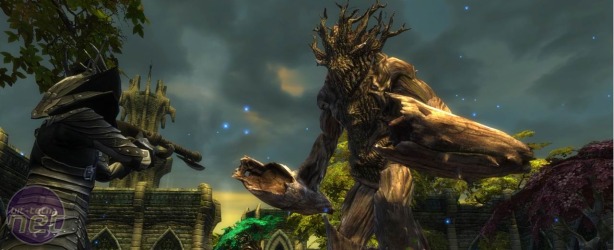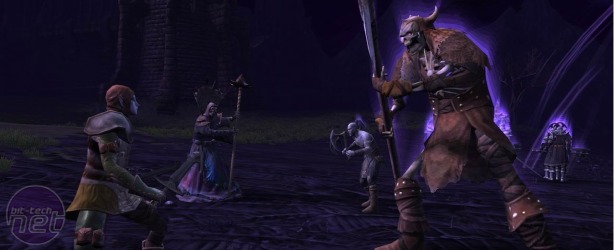
RIFT Impressions
Publisher: Trion WorldsPlatform: PC exclusive
UK Price (as reviewed): £22.79 (inc VAT)
US Price (as reviewed): $39.99 (ex tax)
Let’s get something out of the way – we’re not scoring RIFT in this article. This isn’t a review. Instead, the aim of this piece is to highlight what Trion Worlds’ new pretender to the possibly unobtainable MMORPG crown does well, does not so well and why it’s almost certainly worth a month or two of your playtime. We’re suckers for a good old fashioned MMORPG. Not only does RIFT regurgitate the tried-and-tested staples of other well-known games in the genre, but it does an admirable job of bringing a host of new angles and improvements too.
It’s impossible not to draw parallels to the mightiest of modern day MMORPGs – Blizzard’s World of Warcraft, but RIFT’s influences are deeper than just Azeroth’s fingerprint. It’s built on foundations that stem all the way back to classics such as SOE’s original EverQuest (and indeed its sequel). There are hints of influences from more recent efforts too, such as the ill-fated Age of Conan and the slightly less ill-fated Warhammer Online: Age of Reckoning.
You can play RIFT in the traditional grind-through-quests-PVE route, if that's what you want. You can also opt to get your enjoyment from the PvP side of the game, but RIFT is best enjoyed when you bounce around the various different playstyles; a strategy that's enlivened by the excellent public grouping system and the game’s namesake rift encounters.
The highlight for most players will be these freeform rift encounters. Random tears in space-time see malevolent forces pour into the world of Telara with shocking frequency and randomness. These tears often start small, but can swell to huge devastating assaults through Telara’s progressively higher level zones. Six different flavours of rift exist. Air, Water, Fire, Death, Life and Earth all spew forth their own collection of beings that, if left unchecked, begin to take over the player’s zones. They can even get to the point where the mobs are taking over NPC quest hubs, towns and safe havens.
It’s these moments that add a uniquely dynamic level of excitement to RIFT that’s yet to be matched or even seen in other competing games. RIFT’s two factions - the Guardians and the Defiants – can fight all they want, but RIFT’s diamond moments occur when the NPC critters pouring through these inter-dimensional holes see both sides band together to save their entire world. Huge public battles commence, contribution points are won and lost, and treasures and XP are gained. It’s all rather exciting.
RIFT’s other main attraction is its excellent character class and progression system. Player characters are known as Ascended – heroes of note that have been given another chance to make a difference – in this case, kicking the game’s main baddy, Regulos, squarely in the pants.
With four basic archetypes known as Callings, Ascended can opt to play as Warriors, Mages, Clerics or Rogues. This base class is then fleshed out, as each Calling can adopt and use three different Souls at any one time from a selection of eight. As characters level-up and progress, they will be able to flip between souls; a feature that essentially provides a near-infinite level of customisation.
It’s incredibly refreshing to use RIFT’s Callings system after being locked down to specific roles for so long in other MMORPGs. Clerics can heal, deal damage and even tank if they want. What's more, Mages aren’t stuck at the back of the raid-nuking anymore, and they can act as the back-up medic of a party or a pet-master who deals damage by proxy.
Each Soul has a Soul Tree system too, which enables players to dump the points they earn when they level-up into new abilities, improved skills and so on. The roots at the bottom of the skill trees unlock different traits, and the skills on the branches of the tree act like those would in, say, World of Warcraft.

MSI MPG Velox 100R Chassis Review
October 14 2021 | 15:04











Want to comment? Please log in.